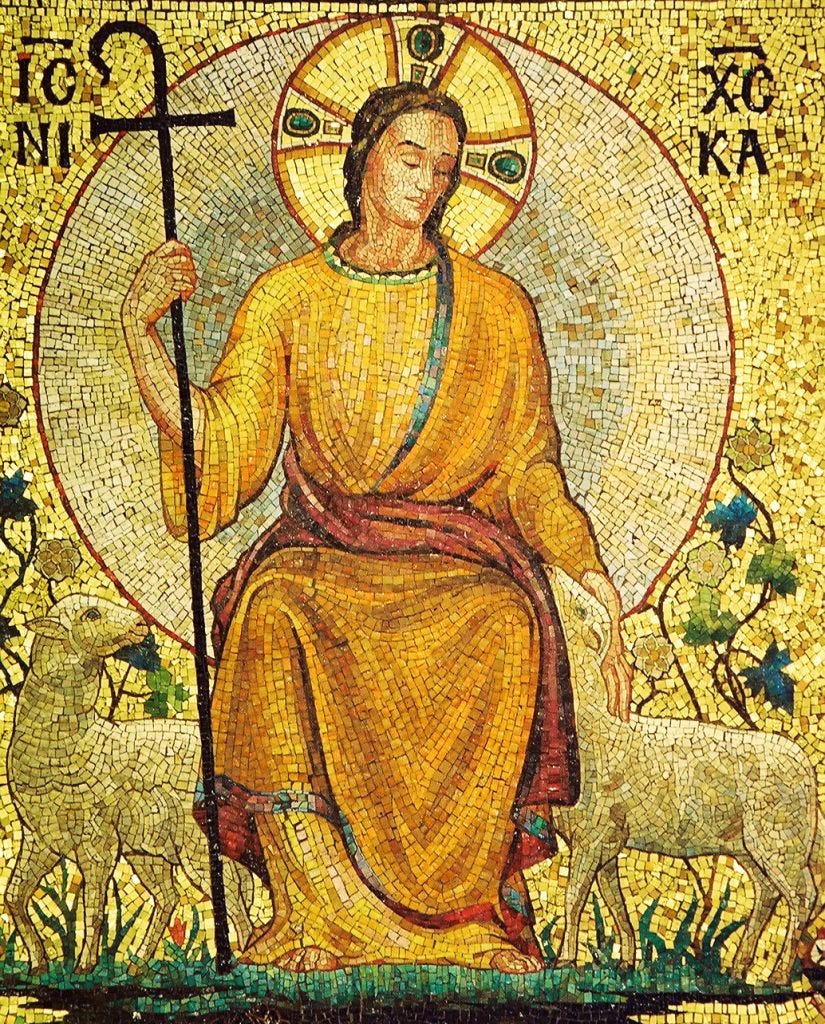
In the Gospel Antiphon today, we hear the words of Jesus, “I am the Good Shepherd.”
His words remind us of the best-known of all the Psalms: “The Lord is my shepherd, I shall not want. He makes me lie down in green pastures. He leads me beside still waters. He restores my soul. He leads me in right paths for his name’s sake. Even though I walk through the valley of the shadow of death, I fear no evil; for you are with me.”
These words are meant to give us comfort. But they also might prompt a question: If God is the Good Shepherd, then how come he lets so many bad things happen to his sheep?
Sometimes it can seem like this Good Shepherd isn’t around: far from feeling like a lamb in his arms, sometimes we can feel like a sheep left alone in the wild.
Looking at the times in our life we’ve been hurt, looking at all the evil and suffering in the world, how do we make sense of this claim, that Jesus is the GOOD Shepherd?
Well, what else does Scripture says about the Shepherd and the Sheep?
Isaiah 53: We had all gone astray like sheep, all following our own way.
Jer 50: My people have been lost sheep; their shepherds have led them astray.
Ez 34: The Lord said: I will deliver my flock. I myself will search for my sheep. The lost I will search out, the strays I will bring back, the sick I will heal.
Luke 15: Which one of you, having a hundred sheep and losing one of them, does not leave the ninety-nine in the wilderness and go after the one that is lost until he finds it?
Rev 7: They will hunger and thirst no more; the sun will not strike them, nor any scorching heat; for the Lamb enthroned will be their shepherd, and he will guide them to springs of the water of life, and God will wipe away every tear from their eyes.
Isaiah 53: Though harshly treated, he submitted. Like a lamb led to slaughter or a sheep silent before shearers, he did not open his mouth.
Scripture tells us, the Lord has not forgotten his sheep but will rescue and save them and restore them to fullness of life.
But Scripture also teaches us how all this started: we wandered off; we let in the wolves. Because of our sin, all of creation has been affected. Sickness and suffering and death, all because of sin—all of this has come into the flock like a virus, and it is not easily eradicated.
Of course, we might object: can’t God just fix it, and prevent any more of it?
God does fix it, but not by preventing it, treating us like dumb sheep. That’s where the analogy limps.
We are not dumb animals, to be forced and driven. God made us in his image, his sons and daughters in grace, destined for divine life.
Created in his image and likeness, the Lord gave us freedom. Because freedom is so precious to him, God lets free choices and their consequences have their effect. To do otherwise would make our choices an illusion, making us like puppets.
It is better that God should let sin happen rather than not give us freedom to begin with. It is better, because for all the evil that sin causes, God shows how he can bring a greater good out of this. God does not just do away with all these mistakes we’ve made: He shows his greatness, not by replacing creation, but by redeeming it, by restoring it. And he does so, not by imposition but by our participation, the participation that begins with the free choice of Jesus to give his life to save us.
God doesn’t want slaves; he wants sons and daughters. He wants us to own up to our part in the scattering of the sheep, and with his help, to make all this right.
That is why he sent his Son to become one of us. And so his Son is not just the Shepherd: he becomes one of the sheep, a lamb, and begins for us what we could not begin, because of our sin.
But he does not do it without us; he wants us to join Christ in his work, so that we can become that redeemed flock, those sons and daughters who accomplish the Father’s plan.
God is still the Lord. He is all-powerful, all-knowing, and all-good. His plan is perfect. Even if we don’t see what he sees and know what he knows, we can trust him. And one day we will see his plan in all its detail, and we will know how perfectly beautiful it all is.
But we don’t just wait in darkness. The Lord invites us to share in that victory now: not in a way that would exempt us from the cross; but in a way that, by taking up the cross in trust and faith in the plan of the Good Shepherd, we can begin to experience even now our redemption and restoration, certain that nothing can take us out of the Father’s hand.
So on Good Shepherd Sunday, we should ask ourselves: How is the Lord calling me to greater trust in his plan? What might be keeping me from saying yes? How is he calling me to take up the cross and share in his victory now, to answer his call and share in his work to make all things new?
The Lord IS the good shepherd. He will bring us to green pastures and still waters. He will restore us. Even if we walk through the valley of death, we need not fear, for He is with us to redeem us.



